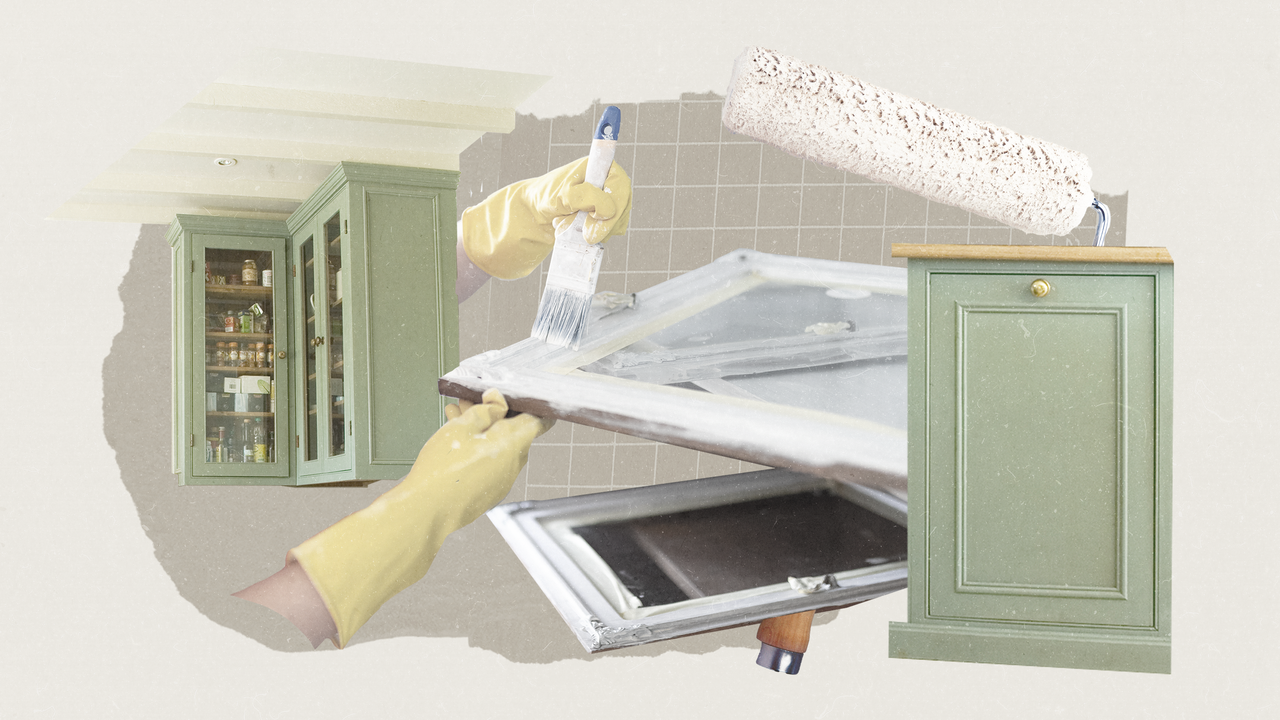Barnard expands on that sentiment, adding that selecting a durable paint is important because kitchen cabinets are high-touch surfaces. “While glossy paints are often noted for their resilience, many durable paint options are available in a range of finishes,” she says. One more important thing to note: While specifying low- or zero-VOC paints is beneficial throughout the home, Barnard says the kitchen in particular benefits from these options as a food preparation space, where there may be more regular contact with painted surfaces than in other areas of the home.
Many brands, including Benjamin Moore, Behr, and Sherwin-Williams, have special formulations made just for doors, cabinetry, and trim, which are easy to apply and provide a bit of self-leveling, resulting in a nice, smooth finish. Fiorilli points customers towards using Sherwin-Williams’ Gallery Series Waterborne Topcoat, a self-sealing, professional-grade, spray-only product that is the brand’s most recommended item for kitchen remodels.
But any high-quality paint—enamel-based paint or latex paint—should work well and be durable enough to maintain its appearance in the face of daily wear-and-tear as well as routine kitchen cleaning. Keep in mind that a gloss or semigloss is likely to stand up better to cleaning and scratches and will provide the most durable finish.
Barnard stresses that testing paint samples is crucial in deciding how to paint your kitchen cabinets. Reviewing the swatches will give you a strong sense of “how it will look throughout the day and with the space’s lighting,” she says. “It’s also helpful to see how the paint color will interact with existing materials in the kitchen to ensure the desired look or feel,” she adds.
How much does painting kitchen cabinets typically cost?
No surprise here, but the cost of painting your kitchen cabinets can vary drastically based on a variety of factors, including your location, the condition of the cabinets, labor costs, and the price of the paint itself. That said, Barnard estimates that a small kitchen painted without professional labor could cost as little as a few hundred dollars in materials, while professional painters may charge upwards of several thousand dollars for a large kitchen.
Fiorilli echoes that sentiment, noting that cost can vary depending on the type of cabinets, amount of prep, and if the customer wants more than one color used. Typically, a painter will charge by the number of cabinet doors and drawers, says Fiorilli. For example, if the kitchen has 20 cabinet doors and 15 drawers, the painter will charge 35 x “the base rate.” On average, Fiorilli says he and his colleagues hear between $5,000 to $15,000 per kitchen for professional painting costs.
Similarly, AD PRO Directory member Laura Jenkins, founding principal at the Atlanta–based firm Laura W. Jenkins Interiors, ballparks the figure around $8,000 to $15,000. “This can feel pricey, but keep in mind that all new millwork would be thousands of dollars more,” she says.
For some people, hiring pros is definitely worth the expense. “In the hands of a great painter, painting your kitchen cabinets can give them a facelift beyond just a new color scheme,” Jenkins says. “A skilled painter will fill chips and cracks, tighten hinges, caulk gaps.”
Do you need to sand cabinets before painting?
Skipping this time-consuming step is a surefire way to lead to a messy finished product. That’s why Calderon and other experts believe that sanding cabinets before painting is a crucial part of the DIY cabinet painting process. “Sanding doors creates a rough surface, allowing the paint to adhere. It will also help remove any previously painted sheens and imperfections from the door, giving it the smoothest possible finish,” she explains. “If the cabinets you are painting have previously been painted, it’s imperative to not only sand off the old paint, but sand a second time smoothing out the wood to prepare the surface for a new layer of paint.” As Barnard notes, priming the cabinets after sanding is another important step to improve the evenness and color of the paint.

